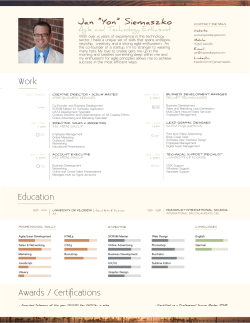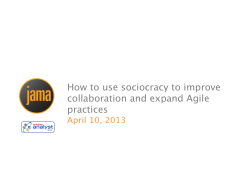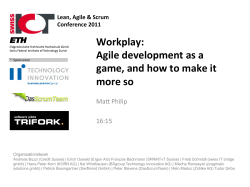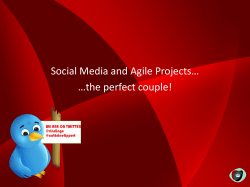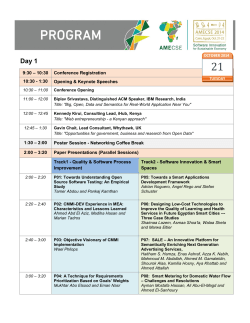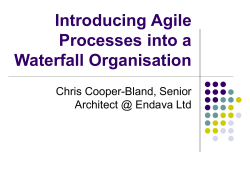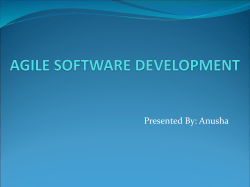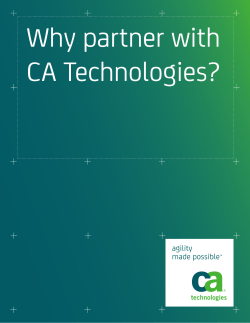
What it is and what it isn’t Agile Project Management
Agile Project Management What it is and what it isn’t Moderator Janelle Abaoag Project Insight Marketing, Public Relations Janelle.Abaoag@projectinsight.com www.projectinsight.net Things to know… All participants will be on mute Questions are welcome Please use the questions box to ask questions The moderator will select questions All questions will be answered today or by email at info@projectinsight.net Webinar recording available in the PI Community Presenter Glenn Meinecke Consultant PMP, CSM www.coreperformanceconcepts.net PMP® and CAPM® are registered trademarks of the Project Management Institute Who Is on the Call? Are you: A Project Manager without your PMP certification? A PMP in the role of a Project Manager? A program manager? Just looking for ways to use Project Insight more effectively? Goals of the Advanced Series Expand your knowledge of more complex tools and techniques Build leadership skills to manage people more effectively Identify practical ways to begin using advanced techniques Explore other methodologies or techniques that enhance project management competency Objectives of This Webinar Understand what agile is and where it came from Compare PMBOK® project phases with the waterfall method and the Agile release Understand the Agile Lifecycle Link PMBOK® Guide Processes to Agile development Section 1: Agile Overview What is agile? Agile history Agile Manifesto Values Agile Manifesto Principles Definition Agile software development - is a group of software development methodologies based on iterative and incremental development, where requirements and solutions evolve through collaboration between selforganizing, cross-functional teams. Wikipedia® Agile Project - is a temporary endeavor undertaken to create a unique product, service or result, using agile values, principles and techniques derived from the Agile Manifesto. Agile History 1950’s - Incremental software development methods are starting to be used. 1974 - E.A. Edmonds writes a paper on adaptive software development. 1990’s - Heavyweight Vs. Lightweight development methods. 2001 - The Agile Manifesto was published. The Agile Manifesto - Values www.agilemanifesto.org Individuals and interactions over processes and tools Working software over comprehensive documentation Customer collaboration over contract negotiation Responding to change over following a plan The Agile Manifesto – 12 Principles Satisfy the customer through early and continuous delivery of valuable software. Welcome changing requirements, even late in development. Deliver Working software frequently. Business people and developers must work together daily throughout the project. Build projects around motivated individuals. The most efficient and effective method of conveying information to and within a development team is face-to-face conversation. Working software is the primary measure of progress. Agile processes promote sustainable development. Continuous attention to technical excellence and good design enhances agility. Simplicity--the art of maximizing the amount of work not done is essential. The best architectures, requirements, and designs emerge from self-organizing teams. At regular intervals, the team reflects on how to become more effective, then tunes and adjusts its behavior accordingly. www.agilemanifesto.org Section 2: Agile vs. PMBOK® Guide Project Phases Agile Life cycle The Agile Project The Agile Release The Agile Iteration The Agile Daily work Project Phases ------ PMBOK ® Project Phases ----- Initial Intermediate Intermediate Intermediate Final ------ Waterfall Project Phases ----- Analysis Design Code Test Deploy ------------ Agile Release ------------ Release Planning Iteration Iteration Iteration Release Retrospective The Agile Project Lifecycle (Fractal) ------------- Agile Project-------------- Product Planning Release Release Release Retrospective ------------- Agile Release ------------ Release Planning Iteration Iteration Iteration Retrospective Daily Work Retrospective/ Demo ------------- Agile Iteration ---------- Iteration Planning Daily Work Daily Work ------------- Agile Daily Work --------- Stand-up Meeting Task Integration Task Integration Task Integration Progress Updates The Agile Project ------ PMBOK ® Project Phases ----- Initial Intermediate Intermediate Intermediate Final ------------- Agile Project-------------- Product Planning Release Release Project Closeout Release Vision Create Product Road Map Software Release Release Planning Create Product Backlog Retrospective The Agile Project (Outputs) Vision of the Product Road map with Release time frames. Product Backlog (Prioritized and Estimated). Other Possible Outputs: High Level Design Functioning software for each release Lessons learned Determine which Agile method to use. The Agile Release ------------- Agile Release ------------ Release Planning Iteration Iteration Iteration ------------- 3 to 6 Months------------- Release Retrospective Release Planning Release Plan: Iteration length, Velocity, User Stories Update the Release Plan Iteration Execution Retrospective The Agile Iteration ------------- Agile Iteration ---------- Iteration Planning Daily Work Daily Work Daily Work Retrospective ------------- 2 to 6 Weeks------------- Iteration Retrospective Iteration Planning Detailed Task list Demo Iteration Execution Story3 : Design, Build, Test Story1 : Design, Build, Test Story2 : Design, Build, Test The Agile Daily Work ------------- Agile Daily Work --------- Stand-up Meeting Task Integration Task Integration Task Integration Demo Stand up meeting: Status, Identify potential issues Update Burn down chart Task Execution: Story Design, Build, Test, Task completion Retrospective/ Demo The Agile Daily Work WBS Difference Between Agile & Waterfall Agile Waterfall Team Motivation (Value Driven) Team Motivation(Plan Driven) Fixed - Resources and Time Boxes Fixed – Requirements. Leadership – Serve the team and remove obstacles Leadership – Manage the team and Risks Process Improvement – Process Improvement - Lessons Constant through retrospectives Learned Project Management Processes Controlling Controlling Controlling Controlling Initiating Planning Executing Closing Agile Management Processes Iteration Backlog & Burndown Product Backlog & Release Planning Iteration Backlog & Burndown Iteration Planning/ Iteration Review Iteration Backlog & Burndown Iteration Iteration Backlog & Burndown Release The End WAHOO! Reference Page www.SlingerConsulting.com Blog.Chadelbrect.com Process.osellus.com www.ambysoft.com Agile Software Development Second Edition. The Cooperative Game, Alistar Cockburn Agile Estimating and Planning, Mike Cohen User Stories Applied For Agile Software Development, Mike Cohen Goals of the Advanced Series Expand your knowledge of more complex tools and techniques Build leadership skills to manage people more effectively Identify practical ways to begin using advanced techniques Explore other methodologies or techniques that enhance project management competency Books for Credentials Achieve PMP® Exam Success Achieve CAPM® Success Program Management Professional (PgMP ®) Study Guide To order: www.jrosspub.com Online Course for 24 PDUs Effective Project Management is now available online! You are invited to learn and earn 24 PDUs with 8 online sessions at your own schedule and pace. Brush up on your knowledge of the fundamentals Find tips and techniques to help you gain control of projects Learn about more complex topics in project management Discover concepts, tools and ways to better manage projects Core Performance Concepts Inc. Effective Project Management Connect Collaborate Perform 2012 Advanced Webinar Series The 4th Wednesday of Every Month - 8:00am PT Topics Jan – Managing Stakeholder Expectations Feb – Agile Project Management : What It Is and Isn’t (NEW!) Mar – Creating Use Cases April – Validating Requirements May – Collaborating within the Politics (NEW!) June – Asking the 4 Questions Many Leaders Overlook (NEW!) July – Creating Test Plans Aug – The Art of Negotiating (NEW!) Sept – More Agile News (NEW!) Oct – Meeting Effectiveness (NEW!) Nov – Managing Business Networking (NEW!) Dec – no webinar; enjoy the holidays! Register Ahead of Time Go to www.projectinsight.net 2 ways to register: Free Project Management Training Training & Webinar Calendar Earn PDUs You will automatically receive your PDUs via email after the webinar For further questions: Janelle.Abaoag@projectinsight.com Earn 1 PDU for each webinar session attended To register your PDUs go to www.pmi.org Login as a member of PMI Select Category B – Continuing Education Knowledge Areas: Integration, Scope, Time, Risk Process Groups: Planning, Executing, Monitoring & Control Enter the information provided on your proof of attendance Click continue
© Copyright 2025
